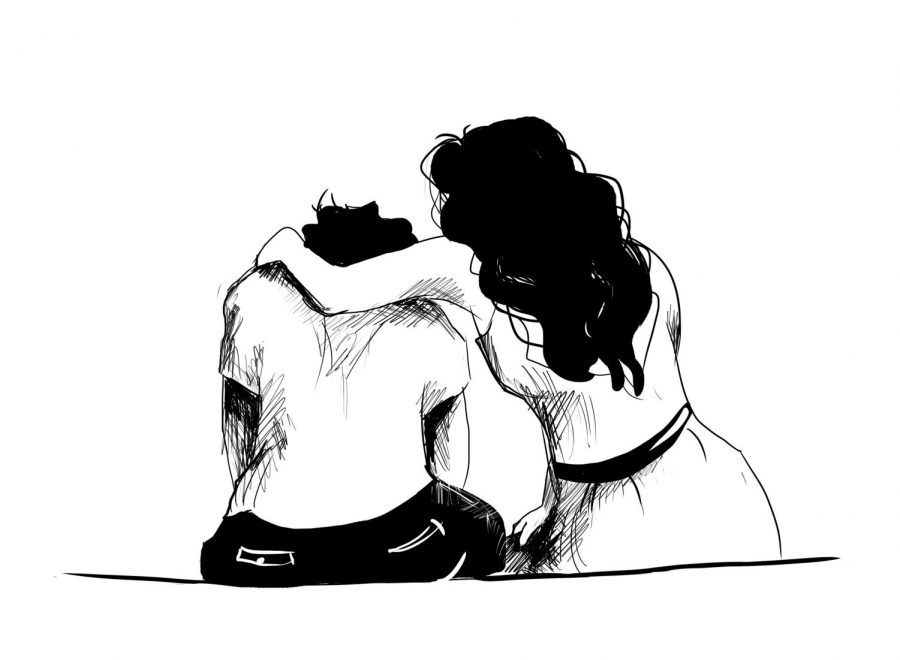Talking about Grief
September 28, 2018
Despite the omnipresence of death and loss in human lives, thoroughly discussing the agonizing grief that comes about after the loss of a loved one remains largely taboo in our society. After losing two grandparents during the past year, it became glaringly obvious to me that conversations about death and loss are largely superficial and painfully inadequate; the profound value in talking about loss seems to go unrecognized. Indeed, the mere mention of a recent death often leads to awkward silences and abrupt changes in subject. While phrases like “I’m very sorry for your loss” mark an excellent starting point in acknowledging the grief of friends and family who have recently lost a loved one, it is of profound importance that genuine, in-depth, and respectful conversations about death occur with much greater frequency.
In the immediate aftermath of a death, when grief is typically extremely raw and all-consuming, it is important for anyone looking to initiate conversations with bereaved people to realize that discussing recently departed individuals cannot possibly make the pain worse. Indeed, discussing grief is often quite healthy and liberating; when my grandpa passed away, it felt really good for me to be able to share stories about him and discuss his formative impact on my life with anyone who was kind enough to genuinely inquire about my emotional state. Since I was already dwelling constantly on my loss, talking about it simply represented an outward expression of pain I was already feeling in great measure.
Recognizing grief for what it is – a completely individual, unique experience – is also crucial. General statements like, “I know what you’re going through” or, “Everything happens for a reason” reflect understandable sentiments, yet are wholly inadequate when attempting to empathize with friends and family about their experience with grief. Such statements attempt to standardize grief and reinforce the illusion that the grieving process is entirely the same for everyone. Good listening skills are also a valuable asset in these conversations, even if listening to a grieving friend can be incredibly emotionally taxing.

While I firmly believe in the value of conversations about loss, bereaved individuals often crave space and time alone. In such a scenario, it seems the best course of action would simply be to offer those individuals the option of a conversation if they feel up to it. This simple act alerts them to the fact that their grieving process is not something they necessarily have to endure entirely alone, yet gives them the ability to initiate a conversation on their own terms, if and when they would like to do so. Whether or not the offer of a conversation is accepted is largely unimportant; what is important is the idea that loss, and its accompanying feelings, are duly acknowledged and never get ignored.
Death – and its impact on others – is one of the only parts of the human life cycle that regularly occurs without adequate acknowledgment. We delight in celebrating the birth of newborns, birthdays and anniversaries, realizing that life is ephemeral and death is inevitable. Yet when death does occur, we might attempt to acknowledge it through attending a funeral service, but likely fail to take the next necessary step and initiate a difficult conversation about death with the people we care deeply about. It’s time to take the plunge and initiate such conversations. We must finally stop ignoring grief.






Vanessa M. Pentz • Oct 2, 2018 at 9:31 pm
Grief. I grieve for myself and I’m not being selfish. My profoundly talented and gifted son killed himself last year. My husband recently passed away. Alcoholism is in our genes. My mother gave me my first drink. I only drank to not feel – I didn’t want anyone touching my as a teenager. Sexual abuse was rampant . . I had to endure it silently. 8 months ago I tried to rescue an elderly faculty member walking alone on a busy highway after he called me in distress. I was under the influence of one prescribed pain killer (had hand surgery the day before) and a glass of wine. HUGE MISTAKE. DUI resulting in one year incarceration with no exceptions for my loss. I opened the third clinic in America offering a microchip against alcoholism. I will lose my business, my career in music, all of my students and my home. Grief . . Grief looks like suicide. I feel it.